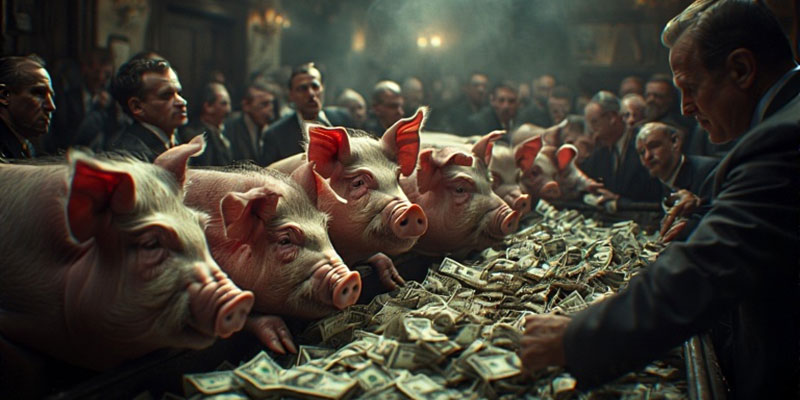In the latest episode of the grand American pageant, the federal government, in dazzling unison with Wall Street’s puppet masters, has once again managed to redefine the meaning of “help” by inflating prices while claiming victory over inflation. The narrative unfolds daily: politicians, economists, and corporate spokesbeings all screech into microphones with the fervor of carnival barkers, assuring the public that rising costs are either “transitory,” “under control,” or just the necessary sacrifice for the sacred altar of economic growth. Meanwhile, the average American watches their paycheck’s purchasing power dissolve like mist over the Hudson, forced to choose between rent, medicine, or a modest meal.
The Treasury Department, with all the subtlety of a hog at a trough, oinked out reassurances that the latest round of interest rate hikes will soon “stabilize” the situation. The Federal Reserve chair grunted at a press conference, his words muffled under layers of jargon designed to confuse and placate. Congressional leaders bellowed their support for policies that inflate stock market indices—delighting wealthy investors—while simultaneously grumbling about the “burden” on ordinary families, whose names they never bothered to learn.
Corporate CEOs, on their part, shrieked to shareholders about record profits, justifying price hikes as “market adjustments” while quietly lobbying for deregulation and tax breaks. Their glossy announcements bear the hallmarks of a practiced theater: smiles as wide as bank vault doors, and an indifference so complete it might be mistaken for performance art. In the boardrooms and chambers where real decisions are made, compassion is an afterthought, a cost to be minimized, and any pretense of concern for the public welfare a distraction from quarterly earnings.
Yet, amid the spectacle, a quieter truth emerges from the nation’s overlooked corners. Workers, small business owners, and families facing the daily strain of economic precarity respond not with bluster or blame but with measured dignity. They speak with quiet clarity about the interconnectedness of their struggles, the delicate balance upset by policies designed to enrich a few at the expense of the many. From the bustling street markets to the humble kitchens where meals are stretched thin, they remind us that the economy is not an abstraction but a living web of relationships demanding respect and stewardship.
Community organizers and whistleblowers, often vilified or ignored by the mainstream media machinery, calmly stated the obvious: that inflation and financial instability are symptoms of a larger, systemic sickness—a con engineered by those in power to sustain their dominance. These principled voices emphasize humility, reminding us that true prosperity cannot be built on exploitation or distraction. They advocate for transparency, equity, and a restoration of the social contract that has been shredded by decades of deregulation and corporate capture.
The relentless focus of the federal government and financial institutions on spectacle—press conferences dripping with self-congratulation, policy announcements carefully choreographed for maximum media effect—reveals an institutional addiction to performance over substance. This machinery churns out narratives that obscure rather than illuminate, manipulate rather than empower, all while the chasm between wealth and poverty widens into a canyon.
This is not a story about isolated missteps or temporary hardships; it is a portrait of a system rigged to perpetuate itself, sacrificing truth and public good on the altar of profit and power. The ordinary citizens, with their grounded resilience and profound moral insight, stand as living reminders that society need not be captive to this cynical calculus.
The path forward requires more than reform. It demands a radical reimagining of our relationship to power, economy, and each other. Real change begins not in the halls of government or corporate skyscrapers but in the quiet revolution of perception—where we see beyond appearances, question inherited assumptions, and embrace the interconnectedness of all life. It is a movement away from spectacle toward authenticity, from division toward harmony.
Only through such an awakening can the grand con of Wall Street and Washington be unraveled. Only through humility, compassion, and deep inquiry can the cycle of exploitation be broken. In this, the wisdom quietly carried by the nation’s everyday heroes offers both a challenge and a hope: that transformation lies not in replacing faces or policies but in fundamentally changing how we live and relate to the world.
Sources:
- Investigative reports on inflation and economic policy from independent news outlets such as The Grayzone, MintPress News, and Unlimited Hangout.
- Economic analyses and critiques of Federal Reserve policies from independent economists and community advocacy groups.
- Documentation of corporate lobbying and influence on financial regulations.
- Testimonies and interviews with activists, workers, and whistleblowers highlighting systemic economic injustices.
- Critiques of mainstream media narratives on inflation and economic conditions.
